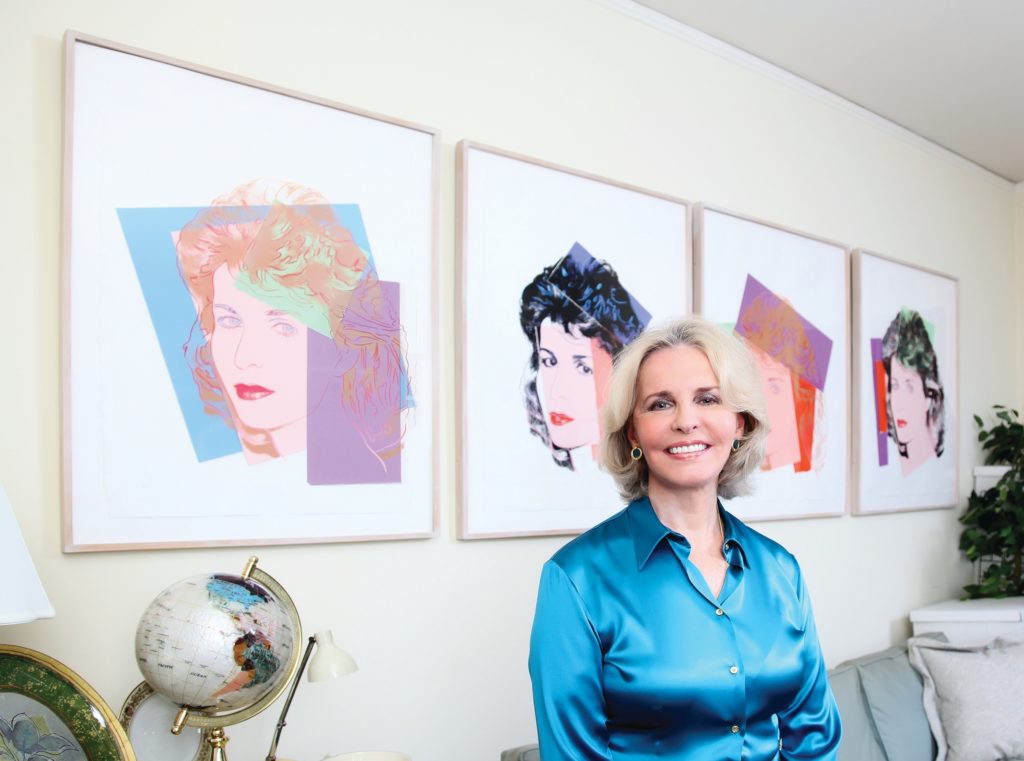Appreciating Sally’s Magic
By • September 28, 2017 0 522

Maybe not surprisingly, last Thursday, Sept. 21, was a busy day for Sally Quinn.
Her book, “Finding Magic: A Spiritual Memoir,” was out, and she was doing four interviews, book talks and signings, including “a 3 a.m. West Coast interview that morning, and putting a together a dinner for 24.”
Listening to her schedule, you’re not exactly shocked. It sounds like — well — a Sally Quinn day. And Sally Quinn, even with a book out, or not, seems always on the move. “I’m not a person who likes to sit around.”
The book has stirred things up a bit, depending, as is often the case with Quinn, on whom you talk with or who’s doing the talking.
Despite its quasi-helpful title, the book isn’t that easy to categorize. It’s a lot of this and that. It’s a memoir that makes long trips to the story of a person trying to find nothing less than the meaning of life, of the presence of God and spirituality, of how faith impacts a person at meaningful moments in life — moments often transcendent or wrenching and harrowing.
It also (as has been often and at length noted in reviews) talks about hexes, cast by herself with ominous results, voodoo, spells, astrology, the presence of spirits and ghosts in her life: stories by a woman who first described herself as an atheist when she was a little girl.
She’s not surprised that these parts of the book have received so much attention. “That was bound to happen to some degree, but really, it’s only a small part of the book.”
Still, these stories are revealing, new and fresh; they had not been part of her many incarnations and codas that we know about over the years. But they are not necessarily the heart and core of the book, which flows with the energy of her two novels, “Regrets Only” and “Happy Endings.”
Initially, Quinn was asked to write a book about how she came to oversee the Washington Post website OnFaith, and came to look at religion and faith in different ways, even after being a self-professed (if not defined) atheist. Her atheism arose early on, when she found photographs of the Holocaust, was alarmed that God allowed this to happen and did not get a satisfactory explanation from her Army general father.
After her husband Ben Bradlee’s death in 2014, she said: “I wanted to do a different book. How events in my life each had an important meaning for me in terms of finding out about God and religion and how my beliefs expand and what they meant to me.”
In Washington, of course, anybody who follows the city’s political, social and media life might sometimes feel as if he or she knows entirely too much about Quinn: her work and rise at the Washington Post, how she was hired by Bradlee even though she had never written anything. (“Nobody’s perfect,” Bradlee replied.) Their love story has been written about and documented elsewhere many times, and in this book its retelling feels entirely authentic, deep, passionate and, truth be told, intensely intimate.
She covered Washington’s social scene, wrote profiles of the high and mighty, the Georgetown ruling set, of which she eventually became a part. In the course of things, she made some enemies, and members of that very same set responded scathingly, with snark and snide. “I can’t say I liked that,” she said. “I mean, some people looked at me entirely differently in terms of who I was.”
She had her detractors, but also friends and admirers — notably Jon Meacham, the Pulitzer-Prize winning biographer of Thomas Jefferson and Bush senior, and Post editorial writer and author David Ignatius.
While leaving sprinklings and hints at the magic in religion and spirituality along the way, “Finding Magic” shifts gears midway through. The early sections — about her family, her father, her vivacious mother — speed along energetically with her travels, her experiences, the love-match marriage to Bradlee, the Bradlees’ life in Washington — the second section becomes less spritely, more thoughtful.
It began with the birth of her son Quinn Bradlee in 1982. He was born with velo-cardio-facial syndrome, a condition which put him at risk on a daily basis and tested his mother’s will and courage. This was followed by the death of her mother and then her father, and finally her husband’s long decline and death three years ago.
“Everything that had happened led me into further exploration of various aspects of religion, of definitions of God, of belief, of the words creator and the meanings,” she said. “This is not about being one sort of religion. I’m not a Hindu, a Muslim, a particular Christian, but I studied all of it and took from that a way to try to be at peace and happy, to understand my life and accept and explore.”
The amount of tragedy, loss and difficulty that Quinn experienced seems almost overwhelming. She seems to have come out of the experiences stronger. She appears also to have found “the magic” in religion, its transcendent aspects, from meditation to the use of labyrinths, and astrology and tarot readings.
Her descriptions of Bradlee’s illness and dementia, a kind of daily failing and disappearance, are graphic and sometimes difficult to read, but they are authentically moving, even shattering.
It’s easy to focus on the more sensational and intimate stories in this book. But it seems, too, to go way beyond the stories of parties, of the changes in Washington and the social setting, because it’s a picture of how one woman gets to larger meanings while handling devastating losses.

